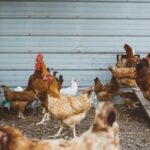H5N1 Avian Influenza found in Mississippi poultry flock
Dec. 23, 2024-The Mississippi Board of Animal Health (MBAH) has been notified by the U.S. Department of Agriculture’s National Veterinary Services Laboratory that poultry from a commercial breeder chicken flock in Greene County, Mississippi has tested positive for highly pathogenic H5N1 avian influenza. Samples from the flock were tested at the Mississippi Veterinary Research & Diagnostic Laboratory, part of the National Animal Health Laboratory Network, and confirmed at the APHIS National Veterinary Services Laboratories in Ames, Iowa.
Avian influenza does not present a food safety risk; poultry and eggs are safe to eat when handled and cooked properly. According to the U.S. Centers for Disease Control and Prevention (CDC), the public health risk associated with avian influenza in birds remains low. As a reminder, the proper handling and cooking of all poultry and eggs to an internal temperature of 165 ˚F is recommended as a general food safety precaution.
SITUATION: The State Veterinarian has quarantined the affected premises, and birds on the property have been depopulated to prevent the spread of the disease. Birds from the flock have not entered the food system. The MBAH is working closely with federal animal health officials in Mississippi on a joint incident response.
The MBAH is actively working with the poultry industry to increase monitoring of flocks statewide. This finding is the first case of highly pathogenic avian influenza (HPAI) in commercial poultry in Mississippi since the spring of 2023. Since November, HPAI has been detected in migratory waterfowl in multiple areas of Mississippi. The poultry industry was notified and put on high alert to increase biosecurity and surveillance for HPAI.
REPORTING: Hobby poultry owners are encouraged to practice good biosecurity and be aware of the signs of avian influenza and report illness and/or death in birds in the MBAH Online Reporting Form https://agnet.mdac.ms.gov/MBAHReportablePublic/birddeathlanding. Information will be routed to a state or federal veterinarian in Mississippi for assessment. Dead birds should be double‐bagged and refrigerated for possible testing. Precautions should be taken when handling sick or dead birds including proper handwashing, using gloves, wearing masks, and sanitation of surfaces that come into contact with sick or dead birds to prevent the spread of avian influenza to people.
Avian influenza in birds can cause sudden death; lack of energy or appetite; decreased egg production; soft-shelled or misshapen eggs; swelling or purple discoloration of head, eyelids, comb, hocks; nasal discharge; coughing; sneezing; incoordination; and diarrhea. A resource for backyard bird health information is online at: https://www.aphis.usda.gov/aphis/ourfocus/animalhealth/animal-disease-information/avian/defend-the-flock-program/dtf-resources/dtf-resources. Biosecurity information and resources can be found by visiting: https://www.mbah.ms.gov/biosecurity/
UPDATES and INFORMATION: Situation updates and status reports about ongoing avian influenza activities in Mississippi, along with critical disease‐related information, will be posted online at: https://www.hpai.ms.gov.






